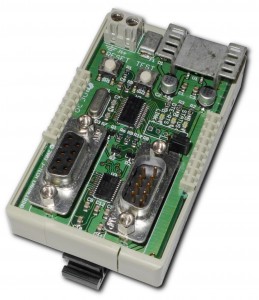Features
- Automated modem supervisory control.
- Default communication speed of 9,600 bps.
- Built-in self-test software.
- Reset Switch.
- Up to 28V DC unregulated power input.
- Field programmable using standard RS-232 cable.
- No special software required, can be programmed using any terminal emulator.
- 94V0 Rated PCB.
- DIN rail mountable enclosure.
Description
The Auto-Dialer permits a remote DNP3 intelligent electronic device (IED) to transmit unsolicited-messages or report-by-exception over a dial-up telephone line. This capability is often a requirement for electric utilities using DNP3 and dial-up for pole-top RTUs and Independent Power Producers (IPPs).
Where dial-up access to a communication channel is required, there are currently two choices: a modem designed for DNP communications, able to intercept data and initiate a dial-out procedure; or, a conventional modem in conjunction with the Auto-Dialer. In the latter case, any modem can be used to initiate communications; the end result is a more cost-effective and modular system.
In a typical DNP system, when data must be reported through a communication channel, it is simply transmitted. The Auto-Dialer sits between the DNP system and the modem, monitoring outbound data. If the DNP system attempts to communicate, the Auto-Dialer will seize the line, establish a dial-up connection via the modem, and reconnect the modem to the DNP system. As this is a non-handshaked mechanism, the DNP system must be configured to transmit relevant data at least three times in order to give the system a chance to establish communication.
- Mechanical Specification
- User’s Manual
- Autodialer Augments DNP3 at BC Hydro (Article featured in the November 2006 issue of Utility Automation & Engineering T&D, now Electric Light & Power.)

